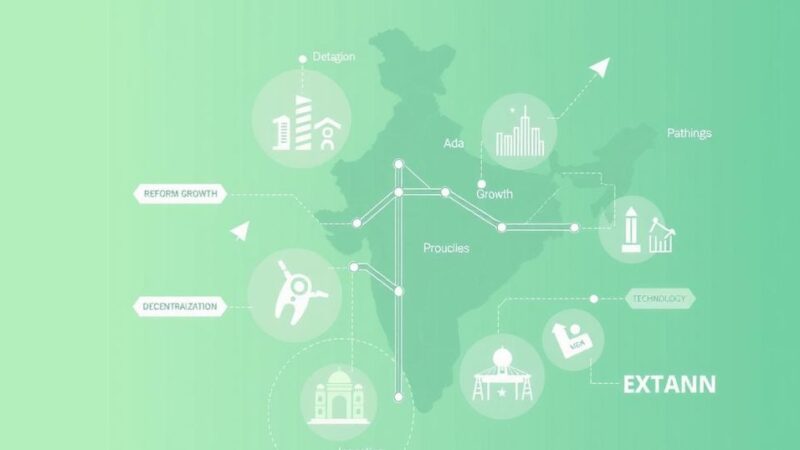The IMF praises Guyana’s extraordinary economic growth driven by oil production and public investment, projecting continued robust GDP growth while noting rising inflation concerns. The fiscal deficit is set to decrease, and the current account surplus will moderate. The IMF supports Guyana’s macroeconomic strategies for stability and inclusive growth and emphasizes the importance of governance and climate change initiatives in sustainable development.
The International Monetary Fund (IMF) has published its Staff Concluding Statement from the 2025 Article IV Mission, announcing Guyana’s remarkable economic growth. This growth is attributed to surging oil production, a strong non-oil sector, and significant public investment in infrastructure. The IMF highlighted Guyana’s real GDP growth rate as the highest in the world, averaging 47% from 2022 to 2024, with expectations of around 10¼% growth for 2025 and an even more robust 13% for the non-oil sector.
Despite the rapid growth, inflation is forecasted to rise slightly, reaching about 4% by the end of 2025, up from close to 3% in 2024. The fiscal deficit, which was 7.3% of GDP in 2024, is expected to decrease to under 5% in 2025, as increased oil revenues counterbalance public spending increases. The current account surplus, a significant 24½% of GDP in 2024, is projected to moderate to approximately 9% in 2025, influenced by imports related to the construction of the fourth oil FPSO vessel.
The IMF’s medium-term outlook for Guyana remains positive, with average growth projected at around 14% annually over the next five years, largely driven by the oil and expanding non-oil sectors. Non-oil GDP is expected to grow at about 6¾% annually. While risks are balanced, effective management is crucial to prevent inflationary pressures and real exchange rate appreciation that could impede sustainable growth.
The IMF commended Guyana’s leadership for their dedication to maintaining macroeconomic stability, fiscal sustainability, and promoting inclusive growth. Although there are no apparent signs of overheating, ongoing monitoring of macroeconomic trends is essential, along with enacting policies to prevent potential imbalances. Furthermore, social transfer policies that boost disposable income and reduce poverty have been positively acknowledged, with recommendations for targeted transfers to meet sustainable development goals.
Fiscal policy is deemed appropriate, focusing on closing the fiscal deficit over time. The IMF noted that the early 2024 increase in the withdrawal ceiling from the Natural Resource Fund permitted substantial capital expenditure exceeding 12½% of GDP. Recommendations include reducing the fiscal deficit by 2031, ensuring long-term sustainability and equity through a consistent medium-term fiscal framework and regular expenditure reviews.
On monetary policy, the IMF supports the current tight stance to control inflation and suggests maintaining broad money growth aligned with non-oil GDP growth. Advice is given to carefully manage banking liquidity and to deepen financial markets to better enhance monetary policy effectiveness. Developing a stronger macroprudential framework and improving banking supervision have also been prioritized by the IMF to ensure financial stability.
Guyana’s initiatives to enhance governance within the National Resource Fund and improve public sector operations have been well-received. Progress in transparency, particularly regarding petroleum revenues, and e-procurement systems have been acknowledged. Additionally, efforts to strengthen anti-money laundering, combat financing of terrorism, and anti-corruption frameworks were also welcomed, along with implementation of the Extractive Industries Transparency Initiative (EITI) standards.
The IMF recognized Guyana’s commitment to climate change mitigation through its Low Carbon Development Strategy 2030. Key initiatives like the Gas-to-Energy project are expected to provide reliable electricity strategically, while aligning with cleaner energy goals. The IMF acknowledged improvements in fostering inclusive growth and enhancing workforce skills, especially regarding women’s participation in the labor market, and praised reforms that enhance productivity and trade connectivity.
In summary, the IMF continues to support Guyana’s modernization of its statistical systems, which are vital for effective policymaking. The anticipated updates to national accounts and household budget surveys, together with regular labor force surveys, are expected to give essential data for guiding future policy decisions.
The IMF’s assessment emphasizes Guyana’s impressive economic growth and highlights the significance of managing macroeconomic stability and fiscal responsibility. Continued support for targeted social and fiscal policies, effective monetary controls, and governance improvements will be vital for sustaining growth. Furthermore, efforts to address climate change alongside labor market enhancements play a crucial role in fostering inclusive economic development. Guyana’s proactive measures and investment in infrastructural and statistical systems are vital for shaping future economic policies effectively.
Original Source: newsroom.gy






